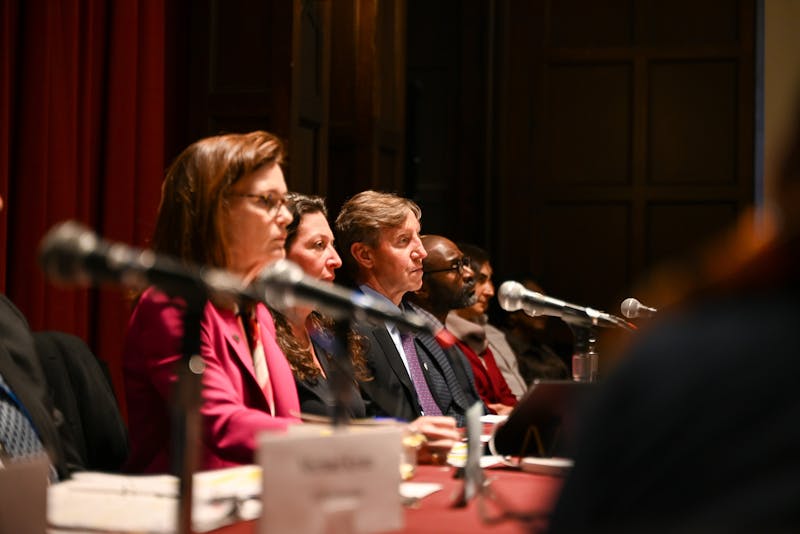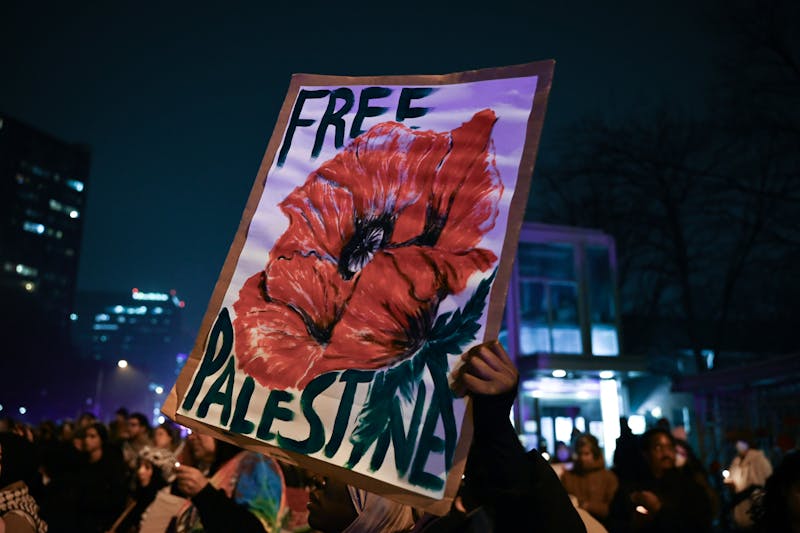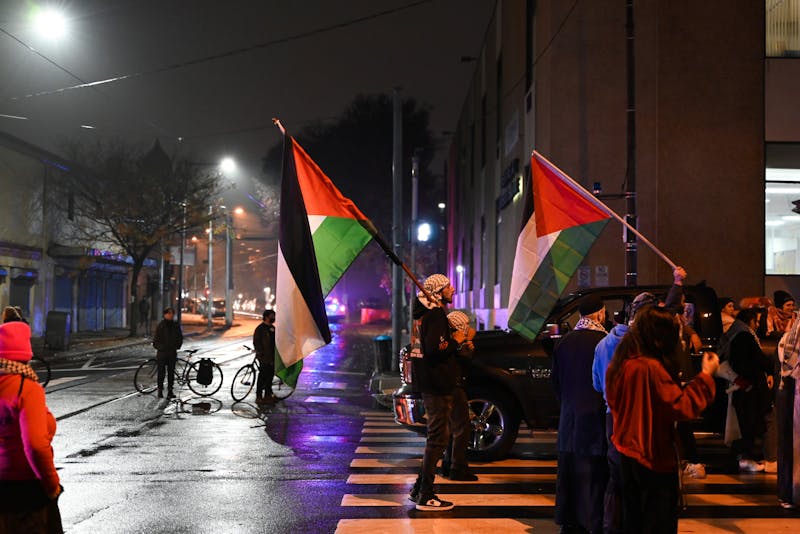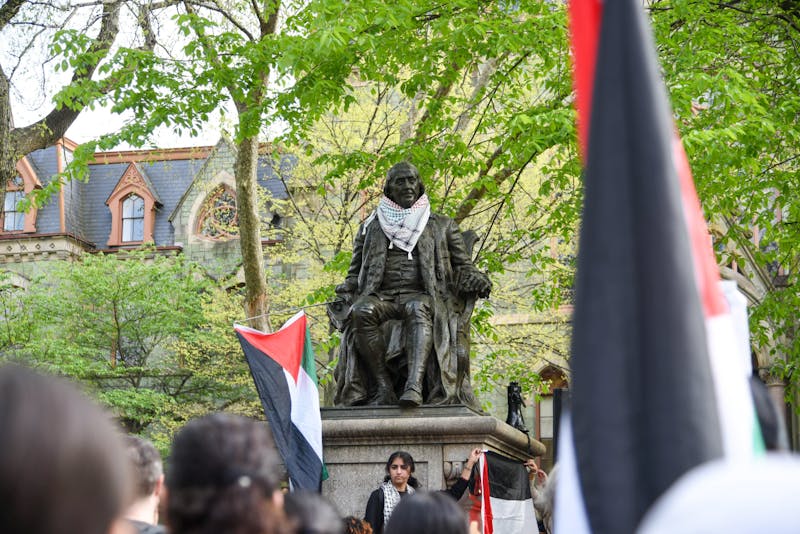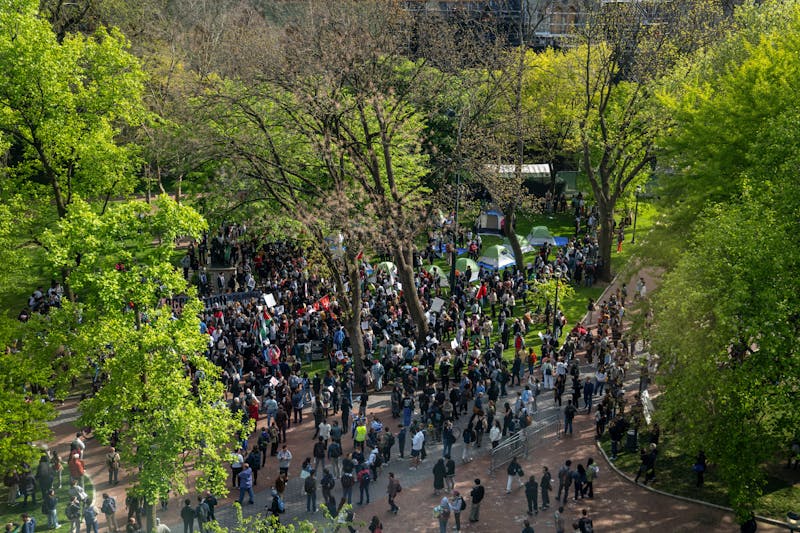
Penn community members expressed surprise and concern after the University revoked Penn Students Against Occupation's status as a registered student group.
The Office of Student Affairs revoked the group’s registration on April 19 following an investigation conducted by the Center for Community Standards and Accountability last month. The deregistration marks the first instance of the University publicly disciplining a student organization.
“This group has failed to comply with policies that govern student organizations at Penn, despite repeated efforts to engage with the group and to provide opportunities to resolve noncompliance,” a University spokesperson wrote to The Daily Pennsylvanian when the deregistration occurred.
A PAO statement published on Instagram on the night of April 19 said that the organization had its registration revoked, adding that the group was forced to remove any affiliation with Penn — including its Instagram username and the ability to host events on campus.
The statement cited ongoing tensions on Columbia University, calling the decision “a thinly veiled threat against similar demonstrations on our campus.” On April 18, Columbia President and former Penn professor Minouche Shafik authorized the New York Police Department to arrest 113 protesters, and suspended all students participating in the encampment.
The DP could not confirm a connection between the activism at Columbia and PAO's deregistration.
PAO’s ban has surprised both the Penn and greater Philadelphia communities. Students, faculty, activist organizations, and politicians have expressed mixed reactions to the ban, with some citing concerns about free speech and the University’s lack of transparency regarding the reasoning behind the decision.
Palestinian advocacy groups denounce ban, call community members to action
On April 23, PAO posted a call to action on Instagram, encouraging community members to email Penn’s president and vice provost of university life with three demands.
In the statement, the group called on Penn to “end the repression and discrimination” against Penn student groups supporting Palestine, “disclose all investments the University currently holds in the companies actively participating in the genocide in Gaza,” and “cut all ties” with Ghost Robotics — a company housed in Pennovation Works that develops four-legged robots that the Israeli military is allegedly using in Gaza.
Penn Faculty for Justice in Palestine also “strongly denounce[d]” PAO’s deregistration in a statement on Instagram on Tuesday, writing that “this follows months of paranoid disciplining of those who dare speak of 'Palestine' or criticize the Israeli government.”
The statement, which was published in conjunction with the Yale University chapter of Faculty for Justice in Palestine, concluded with a celebration “of those who have joined in solidarity protests” nationwide.
On April 24, over 40 Penn and Philadelphia organizations signed a letter to Philadelphia universities in solidarity with PAO. In the letter, the organizations criticized the administration's decision to deregister PAO, stating that they "wholly and utterly reject such flagrant abuses of power."
"[W]e see these administrative decisions for what they truly are: institutionalized efforts to censor and antagonize those students involved in the fight for Palestinian liberation," the letter reads.
Penn-affiliated groups that signed the letter include Freedom School for Palestine, Fossil Free Penn, Queer Muslims at Penn, Natives at Penn, Penn Reproductive Justice, and Police Free Penn. The letter says that the groups "will not rest until our universities cease repression, disclose and divest."
Professors express concern with free speech, university administrators’ tactics
The Executive Committee of the Penn chapter of the American Association of University Professors released a statement on April 23 condemning the actions of university administrations across the country.
The statement, which was obtained by the DP, called the ban of PAO “unjustified” and the latest instance of “the capricious and one-sided suppression of dissent at Penn this year.” It expressed displeasure with the actions of other university administrators in recent weeks.
“University administrators’ accounts of their actions can no longer be trusted, and their statements affirming an ostensible commitment to student safety — made while threatening or deliberately unleashing police violence on their own peaceably assembled students and faculty — have lost all credibility,” they wrote in the statement.
Political science and comparative literature professor Anne Norton wrote in a statement to the DP that the University has an "ethical obligation" to support PAO.
“The University — any University worthy of the name — belongs first to its students and faculty and the staff who support them,” Norton wrote. “The students of PAO will not be silenced. They are doing the work of learning and teaching and the university has an ethical obligation to support them.”
History and education professor Jonathan Zimmerman questioned the reasoning behind the University’s decision to ban the group.
“If this decision was made because of any political position or platform that the group takes, then I believe that sanctions would be hugely inappropriate,” he told the DP. “It's not the business of the University to decide what political positions to take, and even more, which political positions should be rewarded or sanctioned.”
Zimmerman expressed “deep concern” about the possibility of University sanctions against student groups based on their politics.
“We shouldn't be evaluating or rewarding or punishing these groups based on whether we like or don't like their politics. And the question is whether that's happening,” he said.
AAUP-Penn called for PAO to be reinstated as a registered student club and for the Penn administration to “cease its abuse” of University disciplinary system. They also demanded a review of disciplinary procedures at Penn “to protect the freedoms and due process rights of all,” and for the immediate halting of police deployment in response to peaceful protests.
“Our university administration must end its campaign of one-sided suppression of political dissent, which discredits the entire institution’s commitment to academic freedom, open expression, free inquiry, and freedom of association,” AAUP-Penn wrote.
Free speech, University transparency called into question
Penn alumni and politicians have also expressed concern with the Office of Student Affairs’ lack of transparency surrounding the reasoning behind PAO’s ban.
2004 University of Pennsylvania Carey Law School and Fels Institute of Government Administration graduate and former Legislative and Policy Director for the Foundation for Individual Rights and Expression Joe Cohn told the DP that “[if] the recognition was denied, as the University claims, for failure of the organization to identify the student organizers, that is a neutral requirement and would be a valid reason for withholding recognition.”
“But if, under investigation, it proves that that information was supplied, and it's really an attempt to satisfy all their powerful countries that are pressuring the university to suppress pro-Palestinian speech, then that would be unjustifiable,” Cohn added.
Philadelphia City Councilmember Jamie Gauthier (D-Pa.) — who represents the City Council's third district which contains Penn's campus — also called for increased transparency about the decision to ban PAO in a statement to the DP.
"I'm concerned by the University's decision to revoke the student group status of Penn Students Against the Occupation and I am looking into the matter," Gauthier wrote. "The Office of Student Affairs must be more transparent about how they came to the serious decision to restrict a group of students' right to organize and speak freely."
Cohn told the DP that “universities need to be careful to protect the free speech rights of students on either side of any issue, controversial or not, and they have to be firm in standing up to pressure to do otherwise.”
Cohn also called for patience when discussing these “controversial” issues.
“We lose our humanity when we don’t extend those kinds of olive branches,” he said.
Jewish community reactions
College senior Eyal Yakoby told the DP that it is "essential to understand [the ban] did not happen in a vacuum."
“Unauthorized protests, harassing students, social media denigrating Jews is what led to their suspension," Yakoby wrote.
Yakoby, who was one of two students who filed a lawsuit against the University in December alleging an insufficient University response to antisemitism, called for consistency from the Penn administration.
“Students, faculty, and alumni stand united in combating groups like PAO which propagate hate,” he wrote. “When hate rears its ugly head, the University must not tolerate it.”
College sophomore and Hillel Student Executive Board member Jake Zubkoff told the DP he was “surprised that Penn was comfortable taking that step.”
“I personally have been concerned with statements made by PAO … [but] a problematic aspect of that organization should not negate the very important role it is playing in events on campus right now,” he said.
Zubkoff expressed concern with how the ban will affect campus discourse and freedom of expression, calling the University's move “counterproductive.”
“I’m concerned how this affects discourse on campus [and] the ability of students to advocate for the people of Gaza,” he said. “Even if these ideas make us uncomfortable, it’s important to be exposed to them.”
Zubkoff advocated for a way to “fill that hole for Palestinian advocacy going forward,” noting that "the campus and the world at large needs it.”
The Daily Pennsylvanian is an independent, student-run newspaper. Please consider making a donation to support the coverage that shapes the University. Your generosity ensures a future of strong journalism at Penn.
Donate







